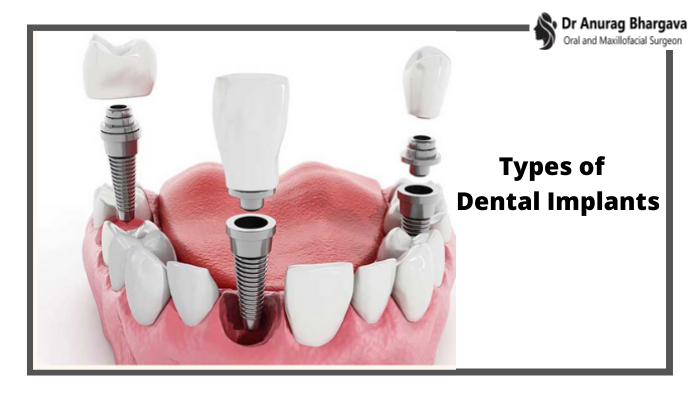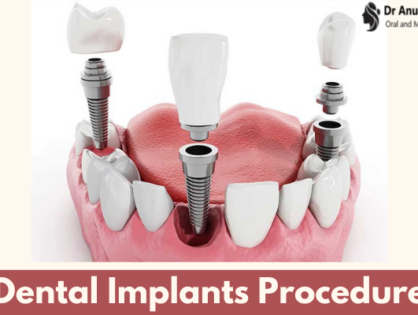Dental care has seen some major set of improvements over a decade, but still, many of us suffer tooth loss due to periodontal diseases, tooth decay, injuries, or lack of regular care. There are two types of dental implants procedures. Earlier bridges and dentures were the only dental treatments available for missing teeth, but with advancements in the field of dentistry, we now have Dental Implants procedure.
What are Dental Implants?
Dental implants are titanium screws or frames which replace the roots of missing teeth. They are surgically positioned into the jawbone. Once they are in place, dentists mount the replacement teeth over them. Dental implants feel and look just like your natural teeth. There are three common types of dental implants that you can choose from Endosteal, subperiosteal, and zygomatic.
Who Can Get Dental Implants Treatment?
Dental Implants treatment is suggested by dentists only when the condition of the jawbone is intact. The dentist performs multiple special tests to examine the amount of bone in your jaw and if it is not enough, or if it isn't healthy enough, it may not be possible to place implants without grafting bone into the area first.
Is it Really Important to Replace Missing Teeth?
Well, yes there are many reasons why you should replace missing teeth.
A complete set of teeth makes your smile even more confident. If your teeth are missing you might end up worrying about facing people. It also at times affects your speech which is again a major reason for your confidence.
Your jawbone starts dissolving when a tooth is lost. This leads to poor shape of your jaw and also loosens the grip of other teeth. Dental implants procedure replace your lost teeth and leave your remaining ones unaffected.
Chewing seems like a task if you have missing teeth. This is one of the major reasons why people have poor nutrition. Raw fruits and vegetables require more chewing.
Someone who finds it difficult to chew may avoid them. Other options, such as blending, pureeing and juicing, are not always considered.
Teeth loss also affects your entire bite which can further lead to problems associated with the temporomandibular joint.
Dental Implant treatment starts from INR 15000 to INR 300000, depending on how many implants are needed and which type of prosthesis you need. Our unique treatment modalities give you quick results. We intend to offer long-lasting treatment with fewer visits. Our recent and successful services include “No teeth to all teeth in just 3 days”.
Types of Dental Implants
There are two different types of dental implants procedures that are widely known:
Endosteal: It refers to an implant that’s placed directly in the bone. After the surgical wound has healed up a metal post is connected followed by a false tooth/teeth.
Subperiosteal: It refers to an implant where a metal frame is fixed right underneath your gum tissue and once it’s healed the artificial teeth are mounted. These are no longer in use today because of their poor long-term results in comparison to Endosteal dental implants.
Dental Implants are not just for teeth replacement, they also help with other dental treatments like supporting dentures or bridges. When implants support removable dentures they provide a stable, secure and comfortable fit. Along with these dental implants are of great use in orthodontic treatments. Dental mini-implants are used to move teeth to the desired position. These implants are of a temporary nature. They are small but are fixed to the bone to help with the orthodontic treatment. They are subsequently removed after their function has been served.
Dental implants are used for the “All-on-4” technique where a complete arch is fixed on just 4 implants. The position of these implants is decided as per the bone strength. This way full mouth rehabilitation has become an easy process.
What are the Advantages of Dental Implants over Other Treatments?
Just like every dental treatment, dental implants are also very advantageous. They help with:
Better appearance: As the nature of Dental implants is permanent when fused with your jaw bone. They look and feel natural like your own teeth.
Improved speech: With other procedures like temporary dentures or bridges, there is the possibility of slipping or poor fitting causing you to mumble or slur your words. Dental implants help you speak without the worry that teeth might slip.
Great comfort: Dental implants eliminate the embarrassing inconvenience of removing dentures as the titanium screw is fixed to your jaw topped with false teeth, so the discomfort of a foreign body is also eliminated.
Easier eating: Dental implants function like your natural teeth. You can eat with confidence and without pain.
Improved self-esteem: Dental implants can complete your smile if you have missing teeth. This improves the levels of confidence and makes you feel better about yourself.
Oral Health: Dental implants don't need any support from adjacent teeth like dental bridges. This way your teeth are intact and have a better life. This in turn improves your oral health. They are also durable if the maintenance is done properly. With those appointments you also get your other teeth check regularly which helps maintain the overall oral health.
How are Dental Implants Placed?
Dental implants treatment is an individualized treatment. A team of professionals who are trained and experienced in restorative dentistry examines your mouth and performs specialized tests to identify the density of your bone. If you are a right fit for the treatment then a small titanium post is placed into the bone socket of your missing teeth. After it heals, a connector post called an abutment is fixed to hold the artificial tooth. The dentist then takes impressions of all your teeth and creates a model of your bite. Accordingly, a crown or artificial tooth is molded which is a perfect match of your natural teeth. Then the dentist fixes this crown to the abutment.
Dental Implants are fused to your jawbone and are a fixed solution to missing teeth. They provide stable support to the artificial teeth placed onto it. Since they are rooted in your jawbone they do not slip or shift which bring great comfort while talking and eating. This way they tend to feel more natural than conventional bridges or dentures.
Dental implants are less painful than tooth extraction. Most of our patients have undergone very little discomfort in the procedure. We give local anaesthesia while performing the procedure.
After the dental implants procedure, mild soreness can be treated with over-the-counter pain medications.
Is Dental Implants Procedure Safe and How Long do they Last?
The dental implants procedure is completely safe if taken care of well. They are more like your natural teeth which require maintenance. If you do not take regular maintenance appointments they can also develop a coating similar to your natural teeth. Untreated and neglected implants often lead to gum infection, bleeding, soreness, and general discomfort. You could also get all these problems with natural teeth.
If your implants are well looked after, and if the bone they are fitted to is strong and healthy, you can expect them to last for many years. However, there is no lifetime guarantee just like any other replacement surgery.
Dental implants act just like your natural teeth. Good oral care will help increase their life. Regular brushing, flossing, and dental maintenance visits to the dentist should be made. Smoking or eating too much sugar can create dental problems. If you are missing a tooth and believe a dental implant might be the right solution for you, start by consulting your dentist.


